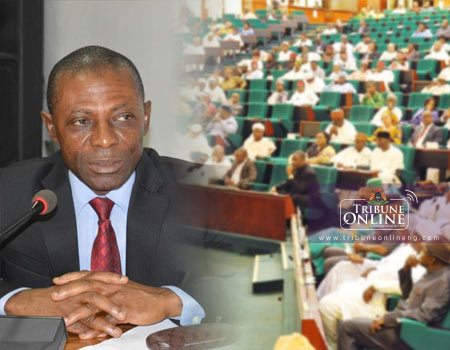
THE recent report by the Auditor-General of the Federation (AGF), Mr. Anthony Ayine, detailing blatant violations of audit law by several government ministries, department and agencies (MDAs) is the latest proof that the Muhammadu Buhari administration’s trenchant rhetoric on integrity and financial transparency is at cross-purposes with the reality. In the run-up to the March 2015 presidential election, candidate Buhari strove to set himself apart from the rest of the field by insisting that his presidency would take a dim view of corruption and financial malfeasance. While Nigerians were realistic enough not to expect a miracle, the Auditor-General’s report shows that, in certain important respects, the Buhari administration has been worse than its predecessors.
The key highlights from Mr. Ayine’s report make for grim reading, and show that MDAs’ compliance with the provisions of the Financial Regulations (FR) 3210(v) regarding submission of audited financial statements has been at its most sketchy in the first two years of the current administration. For instance, as of December 27, 2017, only 51 audited financial statements for 2016 and 149 for 2015 were submitted to the office of the Auditor-General. Furthermore, as of April this year, 109 agencies had failed to submit any financial statements beyond 2013, while 76 agencies last submitted for the 2010 financial year. A whopping 65 agencies have never submitted any account since the current system of fiscal reporting was inaugurated.
ALSO READ: You are APC’s undertaker, Ortom replies Oshiomhole
A defender of the Buhari administration might argue that it inherited a system which allowed agencies to get away with doing little or nothing, and that the only thing the current administration might be said to be guilty of is allowing an already decadent system to degenerate further. That may be true. But it is precisely this kind of degeneration that President Buhari pledged to stem both on the campaign trail and since taking the reins of power. The blame for this lies squarely at its doorstep. If the Buhari administration cannot make governmental bodies under its direct supervision accountable, how does it propose to combat corruption in the entire country?
At any rate, there are specific revelations in the Auditor-General’s report that put the administration itself in the crosshairs. One is the revelation that the Federal Government’s Financial Statement for 2016 contained several “undisclosed revenues, poorly disclosed expenditures, and lack of accountability from government agencies.” Second, the report alleges that, in 2016, the Federal Government “borrowed” N28 billion from the Ecological Fund “to carry out various activities that are not related to development of natural resources,” the purpose for which the fund was established.
If Mr. Ayine was clear about the regression by MDAs into old habits of non-accountability, he was clearer still about the damage it is bound to do, not only to the government accountability process, but also to public morale in general. The Buhari administration has its work cut out. To be taken seriously as an enemy of corruption, it must respond to the Auditor-General’s report by reining in this burgeoning spirit of financial license and making MDAs comply with the law.





